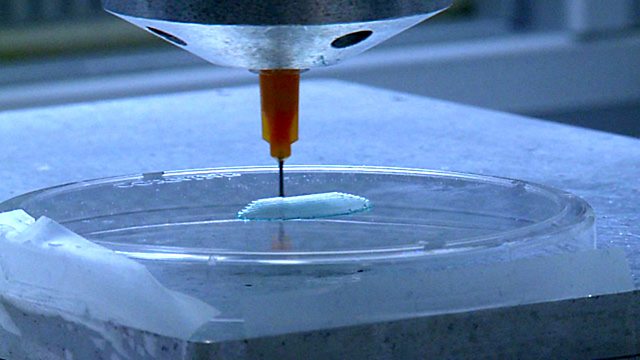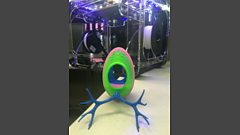3D Bioprinting
Howard Stableford investigates whether advances in 3D printing can benefit nature through physical structures or the advent of 3D bioprinting.
It is hard to escape the explosion of 3D printing stories in the media. Every day it seems, the latest developments in 3D printing are thrust in front our eyes and ears. 3D printing is at the cusp of an electronic and technological revolution. A revolution the likes of which the world hasn't seen since the dawn of the Industrial Revolution over 200 years ago. The indications are that it could soon be possible for 3D Printers to manufacture any object from any material...including living cells.
Presenter Howard Stableford investigates a specific aspect and whether this development in 3D printing can bring real benefit to the natural world.
Along the way Howard discovers a 3D printed reef structure and scientific applications. With species extinction in the natural world is a reality Howard then asks the bigger question, "could 3D bioprinting to reverse this? Are we near the point when we could reproduce a living species?
An Orwellian thought maybe, but is it unreasonable to think that 3D printing might one day bring the iconic Dodo back from the dead.
Last on
Professor Brian Derby
Recently he has been at the forefront of research into the development of inkjet printing as a manufacturing tool. He has particular interest in developing methods of characterising materials and processes in situ. Much of this work has been carried out collaborating with industry and other research groups across the world.
Dr Amber Griffiths

She has over ten years of experience in research and education in applied biosciences, and has worked in both science publishing and policy. Amber's current interests are making physical spaces to bring diverse expertise together (for example hacklabs), developing citizen science asa way to allow society to drive scientific discovery, and furthering the open access/open data movement to broaden access to public funded research.
David Lennon

While conducting marine research for in Saudi Arabia, he started building artificial reefs with French scientist Eric Charbonnel in 1991 and at the time was involved in fish surveys of steel oil platforms in the Gulf. He fell in love with the concept of providing homes for fish and witnessing their enthusiastic uptake of his creations. Ever since, he has studied how fish and other marine biota interact with artificial reefs constructed from a range of materials, including surveys to assess the performance of coastal canal estates, wrecks and concrete pipes as artificial reefs.
Joe Weisenbach

For the past 18 years, Joe has worked in several roles at in Colorado Springs including Engineering Manager, Quality Manager, Applications Engineering and most recently, General Manager for the new 3D Printing Store.
Professor David Williams, OBE

Professor Williams has also recently been appointed as the academic lead for the . The six Research Challenges bring together associated research from across the University to accelerate the delivery of distinctive solutions to regional, national and international challenges.
Broadcasts
- Tue 7 Apr 2015 11:00Â鶹ԼÅÄ Radio 4
- Mon 13 Apr 2015 21:00Â鶹ԼÅÄ Radio 4 FM


